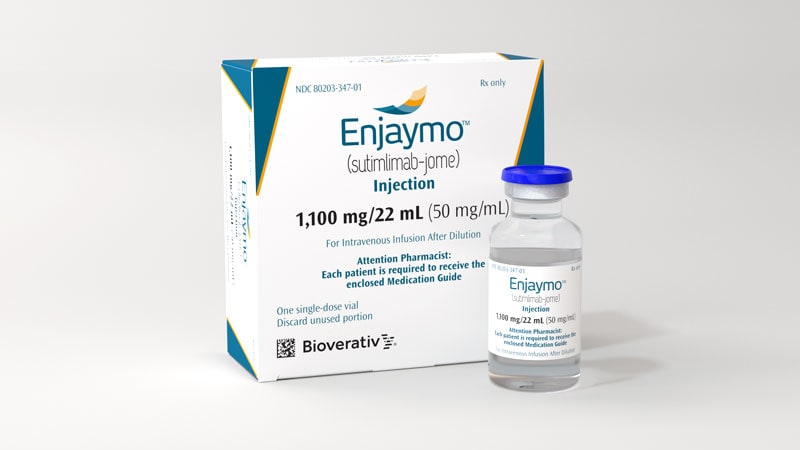A new drug has become the first and only treatment for people with cold agglutinin disease (CAD) that is approved by the US Food and Drug Administration (FDA).
CAD is a rare autoimmune hemolytic anemia, affecting about 5000 people in the United States. It is caused by antibodies binding to the surface of red blood cells, which starts a process that causes the body’s immune system to mistakenly attack healthy red blood cells and cause their rupture (hemolysis). This can lead severe anemia, which is often treated by blood transfusions.
The new product is sutimlimab-jome (Enjaymo), and it works by inhibiting the destruction of red blood cells and so decreases the need for blood transfusions.
“For people living with cold agglutinin disease, it is as if their body’s immune system is waging a war on itself. The relentless destruction of healthy red blood cells is a daily, silent reality for people with CAD. For the first time, we have a treatment that targets complement-mediated hemolysis, which is the underlying cause of the red blood cell destruction in many CAD patients,” commented Catherine Broome, MD, associate professor of medicine at Georgetown University Lombardi Comprehensive Cancer Center, in a company press release.
Broome was the principal investigator in the CARDINAL study, which was the basis for the new approval. In this pivotal study, patients treated with sutimlimab had an improvement in anemia as measured by hemoglobin (Hgb) and bilirubin levels, she commented in the company statement.
The CARDINAL study was a 26-week open-label, single-arm phase 3 study conducted in 24 patients with CAD who had recent history of blood transfusion.
The primary efficacy endpoint was a composite defined as the proportion of patients who achieved normalization of Hgb level ≥12 g/dL or demonstrated an increase from baseline in Hgb level ≥2 g/dL at the treatment assessment time point (mean value from weeks 23, 25, and 26) and no blood transfusion from weeks 5 through 26.
More than half of the patients (13 of 24, 54%) met the composite primary endpoint criteria, with 17 of 24 (71%) patients remaining transfusion-free after week 5. Most patients (22 of 24, 92%) did not use other CAD-related treatments.
For the secondary measures on disease process, patients enrolled in the trial experienced a mean increase in Hgb level of 2.29 g/dL at week 3 and 3.18 g/dL at the 26-week treatment assessment time points (increasing from the mean baseline level of 8.6 g/dL). In addition, there was a mean reduction in bilirubin levels (n = 14) of -2.23 mg/dL from a mean baseline level of 3.23 mg/dL.
The most common adverse reactions occurring in 10% or more of patients were respiratory tract infection, viral infection, diarrhea, dyspepsia, cough, arthralgia, arthritis, and peripheral edema. Serious adverse reactions were reported in 3 of 24 (13%) patients, and these included streptococcal sepsis and staphylococcal wound infection (n = 1), arthralgia (n = 1), and respiratory tract infection (n = 1).
None of the adverse reactions led to discontinuation of the drug, the company noted. Dosage interruptions due to an adverse reaction occurred in 4 of 24 (17%) patients who received the drug.
The recommended dose is based on body weight (6500 mg for people 39–75 kg and 7500 mg for people >75 kg). The drug is administered intravenously weekly for the first 2 weeks with administration every 2 weeks thereafter.
Full prescribing information is available here.
The product is a humanized monoclonal antibody that is designed to selectively target and inhibit C1s in the classical complement pathway, which is part of the innate immune system. By blocking C1s, Enjaymo inhibits the activation of the complement cascade in the immune system and inhibits C1-activated hemolysis in CAD to prevent the abnormal destruction of healthy red blood cells. Enjaymo does not inhibit the lectin and alternative pathways, the company noted.
In the US, Enjaymo received FDA breakthrough therapy and orphan drug designation, and also priority review. The product is awaiting approval in Europe and Japan.
Sanofi says the product is expected to be available in the United States in the coming weeks, with a list price, or wholesale acquisition cost, of $1800 per vial. Actual costs to patients are generally anticipated to be lower, as the list price does not reflect insurance coverage, co-pay support, or financial assistance from patient support programs. The company offers support for eligible patients on 1-833-223-2428.
For more news, follow Medscape on Facebook, Twitter, Instagram, and YouTube.
Source: Read Full Article
